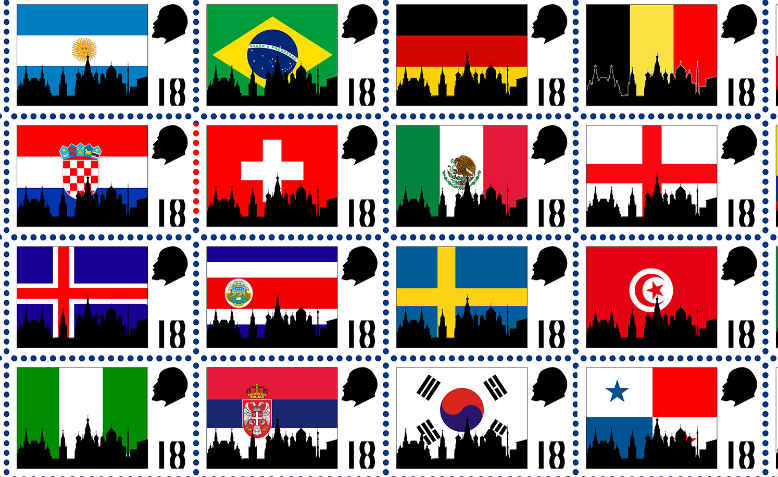 Photo: Hugh Tisdale
Photo: Hugh Tisdale
Will the World Cup which opens today be an orgy of petty-minded nationalism? Philosophy Football’s Mark Perryman doesn’t seem to think so
In between the matches from Russia over the next few weeks here’s a trivial pursuit question to test mates’ footballing knowledge. Which is the only World Cup squad with the entire list of players playing in their own country’s domestic league? Easy! Easy! England, of course, except it’s not just a knowledge of football that provides the answer but politics, history and culture too.
First, the domesticity of our players betrays a certain very English parochialism. More comfortable at home than abroad, Europe, after all, is a foreign country.
Secondly, the political economy of the game, aka English clubs pay heaps more dosh than most overseas outfits.
Thirdly, Anglo-superiority complex. Who in England’s 2018 squad would make it as a certain first-team starter at a top German, Italian or Spanish club? Precious few, there’s a number who aren’t even regular starters at their own clubs, edged out by Johnny Foreigner’s talent.
More than anything else it is political economy which helps explains this.
England’s second most successful World Cup campaign remains Italia ’90. Of England’s starting line-up Lineker had played in Spain, for Barcelona, Waddle was then playing for Marseille in France. Gazza, Des Walker and Platt all went on to play for Italian clubs. And this was by no means unusual. And as for the victorious West Germany side who went on to win the trophy, none of them played in England; though Klinsmann would end up being snapped up by an English side, but that was 4 years hence in ‘94.
The lesson that was drawn from Italia ’90 was that English football had the potential to recover its reputation and popularity post the banning of our club sides from European competition post-Heysel and the human tragedy of Hillsborough. How? This, like so much else after Thatcher’s election in ’79, until Jeremy Corbyn came along to break the spell of its appeal, was down to neoliberal deregulation. The FA effectively gave up its right to govern the elite level of the game by floating off the top division, formerly the First Division and now the Premier League to be run by the clubs themselves. With Murdoch in hot pursuit following the dawning realisation that broadcasting live football was the only way to save his fledgeling satellite TV company, Sky, the deregulation accelerated via the vast wealth that TV contracts were to provide.
Neoliberalism isn’t the same as globalisation but they are intimately connected. The latter always producing a counter-reaction. In Donald Trump’s case, this is his populist America First nationalism. Across Europe, movements for independence, from Catalonia to Scotland. And throughout the same continent anti-migrant movements too. In football’s case, it is the persistent influence of racism and worse amongst certain fan subcultures co-existing with the huge influx of foreign players. Again the World Cup illustrates this. Consulting once more my handy pocket-sized World Cup squads guide for reference, a tasty looking English Premier League eleven out in Russia would line up like this; De Gea in goal, Mendy, Monreal and Christensen providing three at the back, Pogba, Eriksen, Hazard and De Bruyne packing the midfield, up front Firmino, Aguero, and Salah. And there’s plenty more where that lot came from too. Yet precious few fans in their right minds are going to complain about these particular migrant workers, over here, nicking our players’ jobs, with their foreign ways and the like. Racist attitudes to that extent marginalised.
A football club, up and down the divisions, stretching down into non-league even, is easily the most globalised public institution in English society we can think of. The owners, the management and coaching staff, the aforementioned players, the fan-base, the sponsors and advertisers, the TV viewing public. All are globalised and apart from the most embittered, few would object to that. This doesn’t mean the process is entirely unproblematic, football mythologises itself as the people’s game, it has never been thus, clubs owned by the local butcher baker and candlestick maker, in Man Utd’s case quite literally. The Edwards Family were butchers who sold the club they owned off to the Glazers, US sports moguls. A local business elite owned the game in their own local interest, the only difference now is that it’s a global business elite running it in their own trans-national interest.
Resistance to absent owners erupts from time to time, tho’ homegrown owners are often not much better – just look at West Ham. But what frames modern fan culture most of all is a popular cosmopolitanism. While England agonises over how and when it will exit Europe, every football club’s ambition is to get into Europe. This is our cultural barricade against the hateful rise of the Football Lads Alliance. Their values founded on division are the complete opposite to the way the modern game is consumed and supported. For every fan cheering on England over the next few weeks there will be others keeping an interested and supportive eye on how their club’s foreign players are doing, and most importantly, many are fully capable of doing both. One nation, thirty-two nations, for the next three and a half weeks under the same groove. For this precious moment, nothing could be more powerful as a resistance to racism and division than that. And you know what despite FIFA’s worst efforts its broadly equitable too. What have the superpowers of the USA, Russia and China got in common? They’ve not got one World Cup between them. And that’s because international football is regulated, no country on earth however rich is ever going to persuade Messi, Neymar or Ronaldo to sign for them. If that’s not neoliberal globalisation turned on its economic head into something a tad better, I don’t know what is.
The Thirty-Two Nations Philosophy Football T-shirt is available from Philosophy Football


